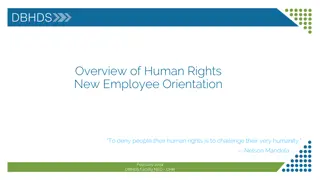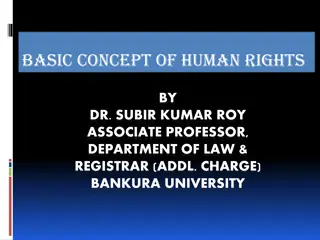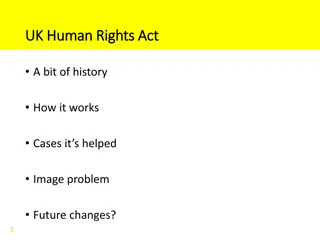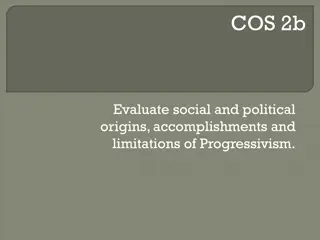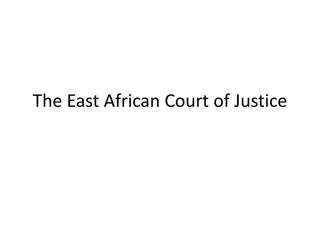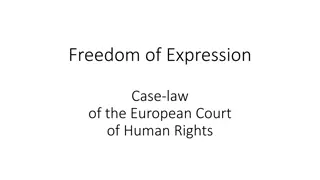Overview of the African Human Rights System
The African Human Rights System encompasses various key elements such as the Organisation of African Unity, African Charter on Human and Peoples' Rights, African Court on Human and Peoples' Rights, African Union, and additional human rights-related treaties and protocols. This system aims to protect and promote human rights across the African continent through legal frameworks, institutions, and mechanisms established over decades.
Download Presentation

Please find below an Image/Link to download the presentation.
The content on the website is provided AS IS for your information and personal use only. It may not be sold, licensed, or shared on other websites without obtaining consent from the author.If you encounter any issues during the download, it is possible that the publisher has removed the file from their server.
You are allowed to download the files provided on this website for personal or commercial use, subject to the condition that they are used lawfully. All files are the property of their respective owners.
The content on the website is provided AS IS for your information and personal use only. It may not be sold, licensed, or shared on other websites without obtaining consent from the author.
E N D
Presentation Transcript
HUMAN RIGHTS IMPLEMENTATION CENTRE The African Human Rights System: An Introduction
The African human rights system in historical context Organisation of African Unity (OAU): Charter of the Organisation of African Unity, adopted in 1963. African Charter on Human and Peoples Rights, adopted 1981 and came into force in 1986 Secretariat in Banjul, the Gambia Initially only established a Commission on Human and Peoples Rights African Charter on the Rights and Welfare of the Child, adopted 1990, into force in 1999 Provides for an African Committee of Experts on the Rights and Welfare of the Child (ACERWC)
Protocol on the Establishment of an African Court on Human and Peoples Rights, 1998, came into force in 2004 and Court operational in November 2006 Establishes an African Court to complement the protective mandate of the African Commission 11 judges Registry in Arusha, Tanzania In 2001 the Organisation of African Unity became the African Union (AU) The founding treaty of the AU: the Constitutive Act Contains more express provisions on human rights Headquarters in Addis Ababa, Ethiopia Article 5 of the Constitutive Act provides for the organs of the African Union: Assembly of Heads of State and Government, Executive Council, and Permanent Representatives Committee, Pan African Parliament, Economic Social and Cultural Council (ECOSOCC) https://au.int/ Other human rights-related AU treaties: AU Convention Governing Specific Aspects of Refugee Problems in Africa, 1969, in force in 1974 Protocol on the Rights of Women in Africa, adopted 2003, into force in 2005 African Youth Charter, adopted 2006, into force in August 2009 African Union Convention for the Protection and Assistance of Internally Displaced Persons in Africa (Kampala Convention), adopted in 2009, came into force December 2012 African Charter on Democracy, Elections and Governance, adopted 2011, into force in 2012 Statute on the Establishment of Legal Aid Fund for the African Union Human Rights Organs, adopted in January 2016 Protocol to the African Charter on Human and Peoples Rights on the Rights of Older Persons in Africa, adopted in January 2016, not yet in force Protocol to the Treaty Establishing the African Economic Community Relating to Free Movement of Persons, Right of Residence and Right of Establishment, adopted January 2018, not yet in force Protocol to the African Charter on Human and Peoples' Rights on the Rights of Persons with Disabilities in Africa, adopted January 2019, not yet in force The regional economic communities also have courts, e.g. East African Court of Justice.
A brief introduction to the African Commission on Human and Peoples Rights by its current Chair, Prof Solomon Dersso See this introduction by Prof Dersso
The Rights in the African Charter The African Charter on Human and Peoples Rights Under Article 1 States have an obligation to take legislative and other measures to give effect to rights in the Charter. This is an important underpinning provision There is a wide range of rights in the Charter: non-discrimination and equality before and equal protection of the law (Articles 2 and 3); right to life (Article 4); freedom from torture and other forms of ill-treatment and prohibition of slavery (Article 5); Right to liberty and security of the person, and prohibition on arbitrary detention (Article 6); Right to fair trial (Article 7); Freedom of conscience and to profess and practice religion (Article 8) Right to receive information and to freedom of expression (Article 9) Right to freedom of association (Article 10) Right to freedom of assembly (Article 11) Right to freedom of movement, including right to seek and gain asylum and prohibition on mass expulsion (Article 12) Right to participate in government (Article 13) Right to property (Article 14)
Rights in the African Charter. Right to work (Article 15) Right to best attainable physical and mental health (Article 16) Right to education, to take part in cultural life of community, and protection of morals and traditional values (Article 17) Protection of family, elimination of discrimination against women and protection of rights of women and child, aged and persons with disabilities (Article 18)
Rights in the African Charter Peoples Rights: an extensive list of rights, which is often seen as unusual, when compared with other human rights treaties. These rights are: All peoples are equal (Article 19) The right to self-determination and rights for colonized and oppressed peoples in their liberation struggles (Article 20) A people s right to freely dispose of wealth and natural resources, to lawful recovery of property and appropriate compensation, and the obligation of the State to eliminate all forms of foreign exploitation (Article 21) The right of a people to development (Article 22) The right of a people to national and international peace and security and the State obligation not to engage in subversive activities (Article 23) The right of a people to a general satisfactory environment (Article 24)
Additional points and individual duties The State has an obligation to promote respect for the rights through education (Article 25) The State has an obligation to guarantee the independence of the courts and to allow establishment of national institutions for human rights (Article 26) The Charter contains several articles on individual duties. This is also seen as an unusual feature of the Charter. These are contained in Articles 27-29 These provisions have been little used. However, with respect to Article 27(2), the African Commission and African Court have held [t]he only legitimate reasons for limitations to the rights and freedoms of the Charter are found in article 27(2) ... . The rights in the ACHPR are therefore to be exercised with due regard to the rights of others, collective security, morality and common interest (Communications 105/93, 128/94, 130/94 and 152/96, Media Rights Agenda, Constitutional Rights Project, Media Rights Agenda and Constitutional Rights Project v Nigeria, October 1998, paras 68 and 69. Before the African Court, see African Court on Human and Peoples Rights, In the Matter of Lohe Issa Konate v. Burkina Faso, Application No. 004/2013, Judgment on the Merits, 5 December 2014, para 134). Unlike other human rights treaties, there is no derogation clause in the Charter, which usually enables States to derogate from certain rights during times of war or other public emergency. The African Commission has held that: The African Charter, unlike other human rights instruments, does not allow for State parties to derogate from their treaty obligations during emergency situations. Thus, even a civil war cannot be used as an excuse by the State violating or permitting violations of rights in the African Charter (Communication 74/92 Commission nationale des droits de l'Homme et des libert s v Chad)
The organs and mechanisms of the African Charter
The African Commission on Human and Peoples Rights Established by Article 45 of the African Charter Eleven members, appointed in their independent capacity (Article 31). Information about the current and past Commissioners can be found here: http://www.achpr.org/about/ Commissioners are part time, with a full time Secretary and staff at its headquarters in the Gambia. Sessions are now held At least one a year will be held in a country other than the Gambia. For example, the 64thOrdinary Session in 2019 was held in Egypt. This enables greater local civil society participation and government engagement. The African Commission has appointed a number of Special Rapporteurs and Working Groups: http://www.achpr.org/mechanisms/ They cover a range of thematic areas (such as women, refugees, and extractive industries) as well as practicalities (e.g. Working Group on Communications) Held by individual Commissioners (as Special Rapporteurs) or a combination of Commissioners with or without external experts (e.g. Committee on the Prevention of Torture in Africa) The African Commission receives its funding from the AU (Article 44 ACHPR) but can also receive funding from other sources, including donors who support some of the programmes and work particularly of its special mechanisms.
Engaging with civil society and other actors The African Commission has a long standing engagement with civil society and non non- governmental organisations. - Organisations can apply for observer status, thereby enabling them to make statements on certain items of the agenda in the public sessions and disseminate documents. In turn, organisations should submit reports to the African Commission on their activities. Resolution on the Criteria for Granting and Maintaining Observer Status to Non- Governmental Organizations working on Human and Peoples Rights in Africa - ACHPR/Res.361(LIX)2016 The African Commission has recognised the important role that National human rights institutions (NHRIs) can play: NHRIs can apply for affiliate status with the African Commission which enable them engage with the African Commission, participate in its sessions, and commit to assisting the Commission in the promotion and protection of rights in the African Charter. Resolution on the Granting of Affiliate Status to National Human Rights Institutions and specialized human rights institutions in Africa - ACHPR/Res.370(LX)2017
The African Commissions interpretive mandate Article 45(3) of the African Charter requires the African Commission to Interpret all the provisions of the present Charter at the request of a State Party, an institution of the AU or an African Organisation recognised by the AU . The African Commission has interpreted the provisions of the African Charter through: Decisions on communications Adoption of Resolutions, including on thematic issues. E.g. Resolution on the Respect and the Strengthening of the Independence of the Judiciary, ACHPR/Res.21(XIX)96 Adoption of Principles and Guidelines, e.g. Principles on the Decriminalisation of Petty Offences in Africa Adoption of General Comments, e.g. General Comment No.5 on the African Charter on Human and Peoples' Rights: The Right to Freedom of Movement and Residence (Article 12(1))
State reporting Article 62: States shall undertake to submit every two years, from the date the present Charter comes into force, a report on the legislative or other measures taken, with a view to giving effect to the rights and freedoms recognised and guaranteed by the present Charter The purpose of this procedure is to ensure a constructive dialogue between the African Commission and the State. The State produces a report The Commission asks questions of State representatives during its public session, where the State delegates will have an opportunity to respond. Written questions may follow. The African Commission will then adopt Concluding Observations providing a summary of the engagement, positive and negative aspects and recommendations for improvement. Questions will be asked about the implementation of these Concluding Observations in the next reporting cycle. Guidelines produced by the African Commission to assist States in the drafting of their reports: Guidelines for National Periodic Reports, 1989: the first set of detailed guidelines; the second a more simplified approach: Amendment of the General Guidelines for the Preparation of Periodic Reports by States Parties, 23rd Ordinary session, Banjul, The Gambia, 20-29 April 1998, DOC/OS/27 (XXIII) Additional guidelines on particular rights: State Reporting Guidelines and Principles on Articles 21 and 24 of the African Charter relating to Extractive Industries, Human Rights and the Environment Indicative Questions to State Parties in respect of Article 5 of the African Charter State Party Reporting Guidelines for Economic, Social and Cultural Rights in the African Charter on Human and Peoples' Rights (Tunis Reporting Guidelines) State Reporting under the Protocol to the African Charter on Human and Peoples Rights on the Rights of Women in Africa
Communications Individuals, organisations or representatives of a people can submit a communication alleging a violation of the African Charter (Article 55) States can also submit a communication against other State(s) (Articles 47-54) but very few instances, see Communication 227/99, Democratic Republic of Congo v. Burundi, Rwanda and Uganda, May 2003 Communications will pass through various stages: Seizure (Rules of Procedure, Rule 115) Admissibility, Article 56 of the African Charter Only if it is held admissible will the ACHPR proceed to the merits The ACHPR will then adopt a decision, with recommendations. Its Working Group on Communications will then follow up on whether those recommendations have been implemented (new Rule 125 of the ACHPR s Rules of Procedure 2020.
The African Court on Human and Peoples Rights http://en.african-court.org/ The Court is established by the Protocol to the African Charter on Human and Peoples Rights on the Establishment of an African Court on Human and Peoples Rights. This was adopted in 1998 and came into force in 2004. The Court started to operate in 2006. Who are the judges? 11 independent judges from among jurists of high moral character and of recognized practical, judicial or academic competence and experience in the field of human and peoples` rights (Article 11 of the Protocol) Their profiles can be found here: https://www.african-court.org/en/index.php/judges/current-judges The Court has an advisory jurisdiction: Article 4 of the Protocol. A member State of the AU, the AU or its organs, or any African organization recognized by the AU , can apply to the Court for an advisory opinion on a legal matter relating to the African Charter or any other relevant human rights instrument. An African organisation recognised by the AU does not include NGOs with observer status with the ACHPR, see Request For Advisory Opinion By The Socio economic Rights And Accountability Project (SERAP) No, 001/2013, 26 May 2017 The Court also has a contentious jurisdiction: Article 5 of the Protocol. The ACHPR can submit a case to the Court. There have been only three cases so far, given the limits of its previous Rules of Procedure, Rule 118, as to when it could submit cases to the Court. The 2020 Rules of Procedure change the circumstances but yet to see how this will be used in practice. In addition, those who can also submit a case are: a State party that has lodged a complaint to the Commission; a State Party against which the complaint has been lodged at the Commission; and a State Party whose citizen is a victim of human rights violations, and African intergovernmental organisations. No cases so far have been submitted by these actors Article 5(3) permits individuals or NGOs with observer status with the ACHPR to submit a case to the Court directly but only if the State against whom the application is addressed has made an additional declaration under Article 34(6) of the Protocol accepting the jurisdiction of the Court in such matters. This has been a particularly contentious article. Only ten States have made such a declaration (Benin, Burkina Faso, C te d Ivoire, the Gambia, Ghana, Malawi, Mali, Rwanda, Tanzania, and Tunisia). Four States have subsequently withdrawn this declaration: Benin, Cote d Ivoire, Tanzania and Rwanda.
The African Charter on the Rights and Welfare of the Child (ACRWC) The ACRWC was adopted in 1990 and came into force on 29 November 1999. It provides for an independent African Committee of Experts on the Rights and Welfare of the Child (ACERWC) of 11 members The Committee has a promotional and protective mandate (Articles 32-46 ACRWC) There is a State reporting mechanism under the ACRWC: States are required to submit a report within two years of the entry into force, and then every three years, on the measures taken to give effect to the Charter The reports should indicate the progress made as well as any factors and difficulties in fulfilling the obligations Guidelines have been produced by the Committee to assist States in drafting their reports: Guidelines for Submitting Initial Reports: https://www.acerwc.africa/wp-content/uploads/2018/04/ACERWC- Guidelines-on-Initial-State-reports-English.pdf Guidelines on the Form and Content of Periodic State Reports: https://www.acerwc.africa/wp- content/uploads/2020/03/ACERWC-Periodic-State-Party-Reporting-guideline-english.pdf The Committee will adopt Concluding Observations on the State report. You can find some examples here: https://www.acerwc.africa/reporting-table/
ACERWC: Communications and investigations Communications: The ACERWC can receive a communication, alleging violations of the ACRWC, from an individual, group or non-governmental organisation recognised by the AU, a State or the UN Investigations: The Committee can undertake an investigation in a State where rights of the Charter have been alleged to have been violated (Article 45 ACRWC) The Committee has produced Guidelines on the Conduct of Investigations: https://www.acerwc.africa/wp- content/uploads/2018/07/ACERWC_Guidelines_on_Investigation.pdf It visits the State and subsequently adopts a report on its findings. See for example, its 2016 report on its visit to Tanzania to examine allegations of violations against children with albinism: https://www.acerwc.africa/wp- content/uploads/2018/07/Investigative_Mission_on_the_Situation_of_Children_with_Albi nism_A4.pdf
ACERWC: Special Procedures and Interpretive Mandate The Committee has ten rapporteurs working on particular themes: Violence against children; Children and Armed Conflict; Birth Registration, Name and Nationality; Child marriage and Other Harmful Practices; Child Participation; Children in Vulnerable Situations; Health, Welfare and Development; Children on the Move; Children in Conflict with the Law Parental Responsibilities and Child Responsibilities; Education; It has also appointed Working Groups on Children s Rights and Business; Children s Rights and Climate Change; and Implementation of Decisions and Recommendation It also has an interpretative mandate. It achieves this through: Adoption of General Comments on particular treaty provisions. See e.g. General Comment on Article 22 of the ACRWC: Children in Situations of Conflict: https://www.acerwc.africa/general-comments/ It undertakes studies on thematic issues, on its own initiative or at the request of others, see e.g. Study on Mapping Children on the Move in Africa: https://www.acerwc.africa/studies-research/ It can also adopt declarations, see Declaration on Ending Child Marriage in Africa, https://www.acerwc.africa/statements-declarations/
Websites African Commission on Human and Peoples Rights: www.achpr.org African Court on Human and Peoples Rights: http://en.african-court.org/ African Committee of Experts on the Rights and Welfare of the Child: http://www.acerwc.org/ African Union: https://www.au.int/ CSOs: Institute for Human Rights and Development in Africa: http://www.ihrda.org/ (see in particular their Case Law Analyser: http://caselaw.ihrda.org/ Pan African Lawyers Union (PALU): http://lawyersofafrica.org/ Human Rights Centre, University of Pretoria: http://www.chr.up.ac.za/
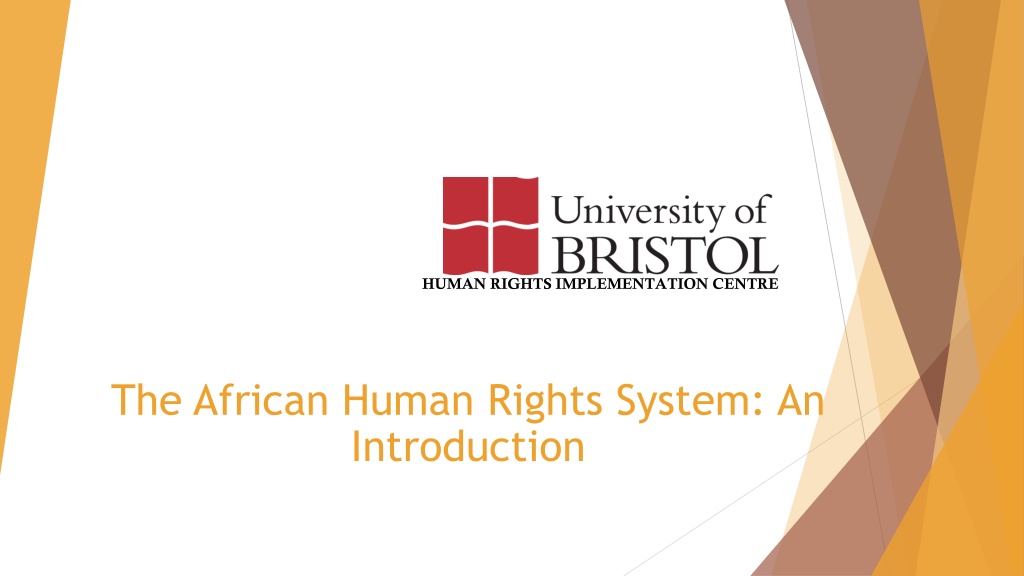
 undefined
undefined








